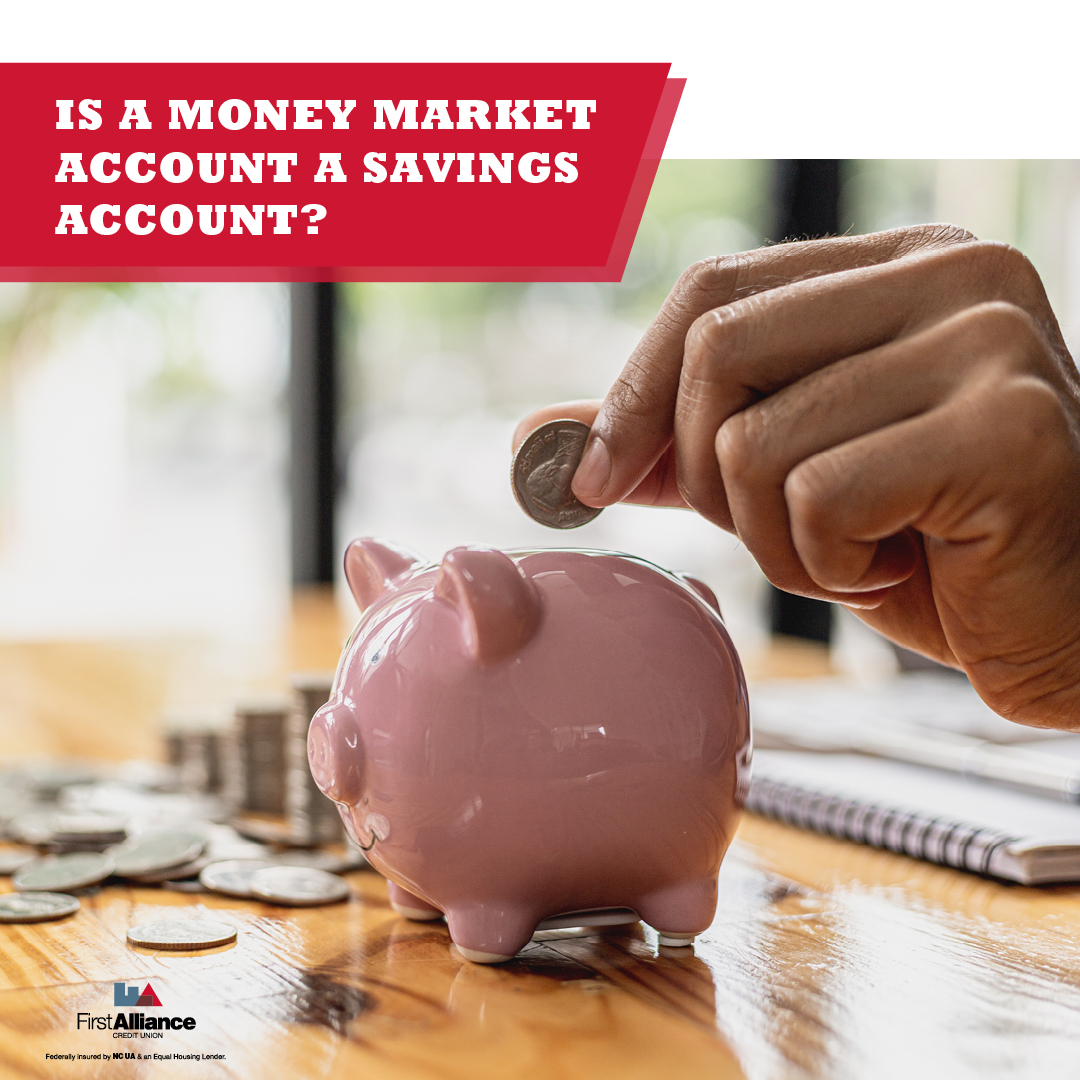Is a Money Market Account a Savings Account?
Here’s a fun challenge–visit the savings account page of a credit union’s website, including First Alliance Credit Union, and look for find money...
5 min read
 Kamel LoveJoy
:
Aug 13, 2024 5:30:00 AM
Kamel LoveJoy
:
Aug 13, 2024 5:30:00 AM

Navigating the world of savings can be tricky, especially when you're just starting out. Whether you’re saving for an emergency fund, a down payment, or that dream vacation, choosing the right account can make a big difference. Let’s dive into the nitty-gritty of money market accounts versus savings accounts to help you decide which one fits your needs best.

A savings account is like a trusty piggy bank, but better. It’s a place where you can stash your cash and earn a bit of interest. Most traditional savings accounts are easy to open, often requiring a minimal deposit, and they offer the security of FDIC or NCUA insurance up to $250,000.
Interest Earned: You earn interest on your balance. High-yield savings accounts can offer significantly higher rates compared to regular savings accounts.
Liquidity: Easy to access your funds for unexpected expenses or emergencies.
Low Initial Deposit: Most savings accounts don’t require a large initial deposit, making them accessible to everyone.
Low Interest Rates: Many traditional savings accounts offer low interest rates, often much lower than other options.
Withdrawal Limits Update: Instead of being limited to six withdrawals or transfers per month for Money Markets and Saving Accounts. The Federal Government now allows for unlimited withdraws or transfers from these accounts.

Jane just started saving for her emergency fund. She’s got $2,000 saved up, which she currently keeps in an apple juice jug in her closet (not the safest or most profitable option!). She’s unsure about the job market and would feel more comfortable with a year’s worth of expenses in the bank. She contributes $200 every month to her emergency fund. Moving her savings to a high-yield savings account would help her money grow safely.
A money market account (MMA) is a hybrid of a savings account and a checking account. It offers the benefits of both: higher interest rates and easy access to your money.
Higher Interest Rates: Money market accounts generally offer higher interest rates than regular savings accounts.
Check-Writing and Debit Card Access: You can write checks and use a debit card, making it easy to access your funds.
FDIC/NCUA Insured: Like savings accounts, money market accounts are also FDIC/NCUA insured up to $250,000.
Higher Minimum Balance: Many money market accounts require a higher minimum balance to open and maintain.
Imagine Jane decides to move her savings to a money market account. With a higher interest rate, her $2,000 would grow faster. Plus, she’d have the convenience of writing checks or using a debit card if she ever needed to access her funds quickly.

Let’s introduce Lisa and Mark, a young couple saving for their first home. They’re aiming to save $20,000 for a down payment within the next three years. They want their savings to grow, but they also need occasional access to their funds for unexpected expenses.
High Interest Rates: They want their savings to grow quickly to reach their goal.
Flexibility: They need to access their money occasionally without penalties.
Security: They prefer their savings to be insured and safe.

Jane is focused on building an emergency fund, prioritizing easy access and low initial deposit requirements. A high-yield savings account suits her needs perfectly, offering competitive interest rates and liquidity.

Lisa and Mark are saving for a significant purchase and require a higher interest rate with some transactional flexibility. A money market account would be beneficial for them, providing higher interest rates and the ability to write checks or use a debit card for necessary expenses.
Accessibility: One major difference is how easily you can access your money. Savings accounts usually don’t come with check-writing or debit card options. Money market accounts, however, offer both, giving you more flexibility.
Interest Rates: Money market accounts typically offer higher interest rates, especially if you can maintain a higher balance. However, high-yield savings accounts can also provide competitive rates without requiring a large deposit.
Minimum Balance Requirements: Savings accounts often have low or no minimum balance requirements, making them ideal if you’re just starting to save. Money market accounts usually require higher balances to avoid fees and get the best rates.
Choosing between a savings account and a money market account depends on your financial goals and how you plan to use the money.
If you’re like Jane and want to build an emergency fund, a high-yield savings account might be your best bet. It offers a good interest rate and easy access when you need it.
If you can maintain a higher balance and want the flexibility of writing checks or using a debit card, a money market account is a solid choice.
Besides savings and money market accounts, there are other ways to save:
Certificates of Deposit (CDs): Certificates of Deposit offer higher interest rates in exchange for locking your money away for a set period.
Online Savings Accounts: Often provide higher interest rates compared to traditional banks.
Joint Savings Accounts: Useful for couples or family members saving together.
No matter which account you choose, here are some tips to help you save effectively:
Automate Your Savings: Set up automatic transfers to your savings account to make saving a habit.
Monitor Your Spending: Use money management apps to track your expenses and identify areas where you can save more.
Start Small: Even small contributions add up over time. Start with what you can afford and increase your savings gradually.
Avoid Fees: Choose accounts with no or low fees to ensure your savings grow as much as possible.
Example: To help Jane get the most out of her savings, she could set up an automatic transfer of $200 from her checking account to her savings or money market account each month. By avoiding fees and earning interest, she’ll reach her goal of having a year’s worth of expenses saved up more quickly.
To make an informed decision, consider using First Alliance Credit Union's online calculators. These tools can help you compare potential interest earnings between different account types, giving you a clear picture of how your savings can grow over time. Simply input your initial deposit, monthly contributions, and interest rates to see projections tailored to your goals.
What if I need to access my savings frequently? If you anticipate needing to access your savings frequently, some money market account might be more suitable due to its check-writing and debit card features. If your money market account doesn't have debit card access, you can still easily transfer funds to a checking account for easy spending using online banking apps.
Can I have both accounts? Absolutely! Having both accounts can help you maximize your savings strategy. Use a high-yield savings account for long-term savings goals and a money market account for funds you may need to access more readily.
How do online savings accounts compare? Online savings accounts often offer higher interest rates and lower fees compared to traditional banks. They are a great option if you are comfortable managing your finances online.
Are there any tax implications? Yes, interest earned on both savings and money market accounts is considered taxable income. Be sure to account for this when planning your finances.
Both savings accounts and money market accounts have their advantages. The key is to understand your needs and choose the account that aligns with your financial goals. Whether you’re building an emergency fund, saving for a big purchase, or just looking to earn more interest, there’s an account out there for you. By exploring your options and making informed decisions, you’ll be well on your way to financial security and peace of mind.

Here’s a fun challenge–visit the savings account page of a credit union’s website, including First Alliance Credit Union, and look for find money...

If you ask the average person how many savings accounts they need, the answer is likely to be, “one.” That’s a logical answer. After all, barring...

If you’re an adult who has some experience with saving and investing, you probably have a good idea about whether a money market account is right for...